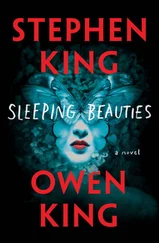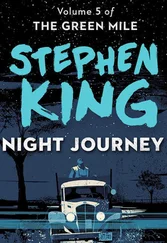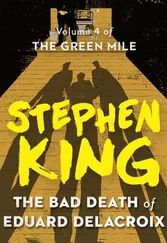Stephen King - Cookie Jar
Здесь есть возможность читать онлайн «Stephen King - Cookie Jar» весь текст электронной книги совершенно бесплатно (целиком полную версию без сокращений). В некоторых случаях можно слушать аудио, скачать через торрент в формате fb2 и присутствует краткое содержание. Год выпуска: 2016, Издательство: VQR, Жанр: Ужасы и Мистика, short_story, на английском языке. Описание произведения, (предисловие) а так же отзывы посетителей доступны на портале библиотеки ЛибКат.
- Название:Cookie Jar
- Автор:
- Издательство:VQR
- Жанр:
- Год:2016
- ISBN:нет данных
- Рейтинг книги:4 / 5. Голосов: 1
-
Избранное:Добавить в избранное
- Отзывы:
-
Ваша оценка:
- 80
- 1
- 2
- 3
- 4
- 5
Cookie Jar: краткое содержание, описание и аннотация
Предлагаем к чтению аннотацию, описание, краткое содержание или предисловие (зависит от того, что написал сам автор книги «Cookie Jar»). Если вы не нашли необходимую информацию о книге — напишите в комментариях, мы постараемся отыскать её.
Cookie Jar — читать онлайн бесплатно полную книгу (весь текст) целиком
Ниже представлен текст книги, разбитый по страницам. Система сохранения места последней прочитанной страницы, позволяет с удобством читать онлайн бесплатно книгу «Cookie Jar», без необходимости каждый раз заново искать на чём Вы остановились. Поставьте закладку, и сможете в любой момент перейти на страницу, на которой закончили чтение.
Интервал:
Закладка:
Stephen King
COOKIE JAR
There was a certain accord between them, right from the beginning. The boy thought the old man looked pretty good for ninety, and the old man thought the boy, whose name was Dale, looked pretty good for thirteen.
The kid started by calling him Great-Grandpa, but Barrett was having none of that. “It makes me feel even older than I am. Call me Rhett. That’s what my father called me. I was a Rhett before there was a Rhett Butler—imagine that.”
Dale asked him who Rhett Butler was.
“Never mind. It was a bad book and only a so-so movie. Tell me again about this project of yours.”
“We’re supposed to talk to our oldest relative, and ask what life was like when he was my age. Then I’m supposed to write a two-page report on how much things have changed. But Mr. Kendall hates generalities, so I’m supposed to concentrate on one or two specifics. That means—”
“I know what specifics are,” Rhett said. “Which specifics have you got in mind?”
Dale considered the question. While he did so, Rhett considered the boy: healthy mop of hair, straight back, clear skin and eyes. There were seventy-seven years between them, and Dale Alderson probably considered that an ocean, but to Rhett it was only a lake. Maybe no more than a pond.
You’ll get across it in no time, kiddo, he thought. The brevity of the swim between your bank and mine will surprise you. It certainly surprised me. He wasn’t sure his great-grandson—the youngest of the lot—even thought of him as an actual human being. More like a talking fossil.
“Speak up, Dale. I’ve got all day, but you probably don’t.”
“Well… you remember before there was TV, right?”
Rhett smiled, even though he felt this was a question to which his great-grandson should already have known the answer. He restrained an urge to say, Don’t they teach you kids anything, because it would have been curmudgeonly and impolite. Not to mention ungrateful. This boy had come to the Good Life Retirement Home for the sole purpose of hearing Barrett Alderson talk about the past, a subject that usually had kids running the other way as fast as they could go. It was only for a school assignment, true, but still. He had come all the way across town on the bus, which made Rhett think of trips he and his brother Jack had made on the interurban line to see their mother.
“Dale, I never even saw a television until I was twenty-one. Radar scopes, yes, but no TVs. I had my first confirmed sighting in an appliance-store window, after I got back from the war. I watched for twenty minutes, almost hypnotized.”
“Which war was that?”
“Two,” he said patiently. “Nazis? Hitler? Japanese in the Pacific? Ring any bells?”
“Sure, yeah, banzai charges and all that. I thought you might mean Korea.”
“When Korea blew up, I was married with a couple of kids.”
“Was my grandpa one of them?”
“Yup, he’d just made his appearance.” And when Vietnam rolled around, I was as old as your father is now. Maybe older.
“So you were stuck with radio, huh?”
“Well, yes, but we didn’t consider ourselves stuck with it.”
Outside his room, from down the hall, came the electronically amplified voice of the retirement home’s recreation director (or one of her minions) calling out bingo numbers. Rhett was happy not to be there, although he supposed he would be tomorrow. He was measuring out the last years of his life—maybe down to months now, considering the blood that had started to show up in the bowl when he took a shit—not in coffee spoons but in coverall games.
“No?” Dale asked.
“Absolutely not. After supper, my dad and my brothers would—”
“Wait, wait, hold that thought.” Dale dug into the pocket of his jeans and brought out an iPhone. He fiddled with it and the screen lit up. He fiddled with it some more and then set it on the bed.
“That thing records, too?” Rhett asked.
“Uh-huh.”
“Is there anything it doesn’t do?”
“Honey, it don’t do windows,” the boy said, and Rhett laughed. The kid might be a little foggy on twentieth-century history, but he was quick. And funny.
Dale smiled back at his great-grandfather, glad the old guy had gotten the joke, perhaps seeing him as a human being after all, or beginning to. Rhett could hope; even at ninety, he remained mostly optimistic, although optimism was a little harder to manage at three in the morning, lying awake and feeling the threads holding him to this life loosening.
“Are you sure it’s hearing me?”
“Yeah, this baby’s got great pickup. Also, I can see your voice on the screen.” He held it up. “Say something.”
“Our radio was a Philco table model,” Rhett said, and watched sound waves roll across the iPhone’s screen.
“See?”
“Yes. Great gadget. Don’t know how we ever got along without them.”
Dale checked the old man’s face to be sure he was kidding. “Good one, Great-Grandpa.”
“No, good one, Rhett.”
“Good one, Rhett. So tell me about the radio.”
Rhett talked for ten minutes or so, about how he and his two brothers would lie on the living-room rug after supper, them with their schoolbooks, his father in his easy chair with his feet up on the hassock, smoking his pipe, all of them listening to the Philco. He told Dale about The Shadow and The Jack Benny Show—how Jack was such a cheapskate—and his own favorite, The Major Bowes Amateur Hour, where the host would hurry talky guests along by saying “All right, all right,” and bang a gong if their performances were bad. But he began to slow down as more vivid memories slipped into the flow of his recollections. Those bus rides with Jack, for instance. And he thought, Why not tell him? You have never told anyone, and you’ll be dead soon enough. Blood in the toilet does not lie, not when you’re ninety.
“That amateur show was really sponsored by cigarettes?” Dale asked.
“Yup, Old Golds. ‘If you want a treat instead of a treatment, smoke Old Golds. They’re good for you!’”
“They could really say that?” The boy’s eyes were shining with fascination.
“They did, but let’s forget about the radio shows. I want to tell you something else I remember.”
“Okay, but those old radio shows are pretty interesting.”
“I can tell you something a lot more interesting, but turn off your gadget. I don’t want you recording this.”
“Really?”
“Really.”
Dale turned off his iPhone and put it back in his pocket. He looked at his great-grandfather with some caution now, as if Rhett were about to tell him he’d robbed a few banks or enjoyed setting dogs on fire as a teenager.
“I had sort of a peculiar childhood, Dale, because my mother was peculiar. Not outright crazy, at least not crazy enough to be locked away in a sanitarium, but very, very peculiar. I was the youngest of three. In 1927, two years after I was born, she moved out of the house, bag and baggage, and into a little cottage on the other side of town—this side of town, in fact, and not far from here, although there’s a shopping center there now. The place was hers by inheritance, from an old aunt, and not much bigger than a garage. She left my father to raise Pete, Jack, and me. Which he did, with the help of a woman who came in to do the housekeeping and watch us when we were too small to be trusted on our own.”
“She never even gave a reason?” Dale asked.
“Said it was for our own protection. My father saw she had a good allowance for her necessaries, and he did it without complaint—those were tough times, but he had a shirt-and-tie job with the American Eagle Insurance Company, and her wants were small. They maintained a collegial relationship. Do you know what that means?”
Читать дальшеИнтервал:
Закладка:
Похожие книги на «Cookie Jar»
Представляем Вашему вниманию похожие книги на «Cookie Jar» списком для выбора. Мы отобрали схожую по названию и смыслу литературу в надежде предоставить читателям больше вариантов отыскать новые, интересные, ещё непрочитанные произведения.
Обсуждение, отзывы о книге «Cookie Jar» и просто собственные мнения читателей. Оставьте ваши комментарии, напишите, что Вы думаете о произведении, его смысле или главных героях. Укажите что конкретно понравилось, а что нет, и почему Вы так считаете.











